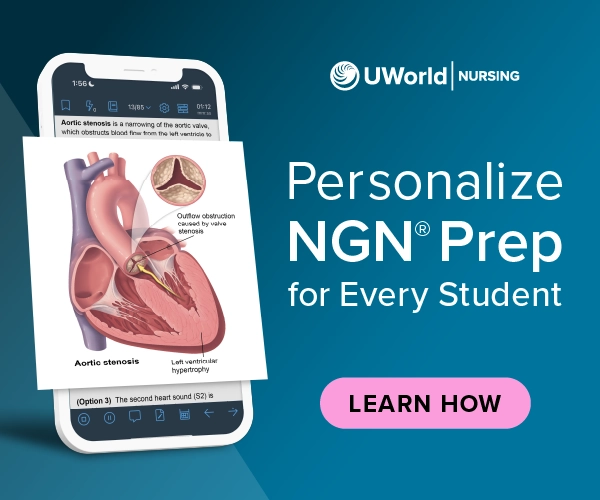As a nurse educator, you've likely witnessed how test anxiety can hinder even the most prepared students from showcasing their true abilities. Our post-pandemic world has seen a significant surge in test anxiety and its impact on academic performance, mental health, and self-esteem in students.
You play a pivotal role in helping your nursing students alleviate test anxiety by implementing anxiety-reducing strategies in the classroom. By pinpointing anxiety triggers and applying these strategies, you can help students conquer high-stakes licensure exams such as the NCLEX without fear.
Causes for Test Anxiety
In August 2024, we surveyed nurse educators across the country to see what your biggest challenges are in the classroom so we can better support your efforts. Responses indicated that helping learners overcome test anxiety is the most significant challenge you face when preparing your nursing students for the NCLEX and other licensure exams.
Test anxiety is an insidious culprit. Like a single loose thread in a meticulously woven fabric, it can cause any student to unravel once it catches. By understanding the causes of test anxiety, you can implement practical solutions to reduce it, helping students face exams without fear.
Demanding Course Load of Nursing School
The rigor of nursing programs is a significant source of anxiety for students. This is particularly true for students whose bachelor's degrees involved a more rigorous curriculum. As students quickly face heavy course loads filled with new concepts, the sheer volume of challenging material can be overwhelming.1
Clinical evaluations further intensify this feeling, as students must demonstrate safe, professional care in real-world settings where actions directly impact client outcomes. The final hurdle to becoming a licensed nurse, the NCLEX, further amplifies student stress as it determines their career eligibility.1
These new pressures come at nursing students from all sides, all at once. Students often feel like they are going from 0 to 100 overnight.2
Solution: Incorporate Coping Strategies Into Nursing Curriculum
You won't be able to lessen the course load of nursing school, reduce the stressors of clinicals, or make the NCLEX easier for students. However, you can incorporate anxiety-reducing strategies directly into your curriculum, encourage mental health awareness on campus, and create a supportive learning environment for students. By doing this, your students will feel more peace when they inevitably face the challenges nursing school brings.3
Ways to implement this solution:
- Encourage your students to take study breaks (5-15 minutes for every 50-60 minutes of study).
- Foster honest conversations about anxiety by having an open-door policy.
- Teach stress management techniques such as breathing exercises or identifying thought patterns.
- Create assignments that are tough but will build confidence for NCLEX prep.
- Offer immediate growth-focused feedback on all assignments so students don’t repeat mistakes.
Fear Surrounding Career Implications of Nursing Exams
Students are anxious not only about nursing exams themselves but also about the implications of their results on their professional careers. Passing high-stakes licensure exams such as the NCLEX causes significant anxiety for students. Failing these exams will delay them from obtaining their nursing license and officially starting their career.
Employers often consider academic performance to indicate a candidate's knowledge and reliability. These high stakes can exacerbate test anxiety, creating a cycle where anxiety leads to poor performance, which, in turn, heightens anxiety.4
Solution: Focus on Career Positives, Not Exam Negatives
Help your students reframe the way they think about high-stakes exams. Reduce test anxiety by encouraging students to view the exam not as a daunting obstacle but as an opportunity to demonstrate their readiness for a nursing career.
Remind students that they've already prepared extensively through coursework and clinical experiences. Emphasize that the hard work they've invested has already equipped them for the real-world challenges they'll face as nurses, making them more than adequately prepared for the NCLEX and other exams. Reinforce the idea that the exam is just another minor step in their journey toward a fulfilling, life-long career.5
Ways to implement this solution:
- Encourage your students to envision themselves as confident future nurses.
- Create mentoring partnerships between senior and new nursing students.
- Remove black-and-white, all-or-nothing language around exams.
- Promote productive struggle as students embrace challenging content.
- Place value on long-term career success over short-term academic gains.
Lack of Time or Tools to Prepare for Nursing Exams
The lack of adequate time and study tools can make it challenging for students to balance heavy course loads, clinical rotations, and personal responsibilities. The fatigue from juggling these demands can leave them with little energy or time to dedicate to effective studying.
Additionally, the sheer volume of information required to learn for exams such as the NCLEX is overwhelming. Students may feel anxious about the vast amount of material they need to recall, fearing that they can't possibly remember everything.2
Solution: Provide Students with Quality Study Tools and Strategies
You play a crucial role in alleviating test anxiety by providing your students with high-quality, time-saving study tools and strategies. Introduce them to resources such as practice exams, study guides, and interactive learning platforms that cater to various learning styles.6
Additionally, you can provide your students with time management strategies to help them maximize their busy schedules. Giving students access to study tools that increase retention and save time will simplify their NCLEX study sessions, helping them feel confident when it's time to test.7
Ways to implement this solution:
- Teach NCLEX test-taking strategies.
- Encourage your students to form study groups.
- Tailor your nursing curriculum to exams such as the NCLEX.
- Simulate clinical decision-making in a low-stakes setting.
- Provide structured training sessions that teach time management skills.
- Provide access to NCLEX-style question banks.
Fear of Failure in Nursing Education
Nursing students often strive to do their best and give their all, which can lead to lots of internal pressure. These students often grapple with an intense fear of failure, which stems from self-imposed pressure to meet personal and professional expectations and a desire not to disappoint family, peers, or instructors.3
The rigorous standards and demands of nursing programs can amplify these feelings, leading students to doubt their abilities, despite their devoted preparation. They may fixate on the consequences of failing a single test rather than focusing on the learning process. This mindset increases anxiety and can hinder performance, creating a cycle where the fear of failure contributes to the very outcome they dread.8
Solution: Encourage Students to Embrace a Growth Mindset
You can help reduce this fear of failure by encouraging students to embrace a growth mindset instead of a fixed one. Promote the idea that intelligence and abilities are not fixed but can be developed through dedication and hard work. Emphasize that failures are opportunities for learning rather than definitive judgments of their capabilities.
Remind students that each test is a stepping stone, offering valuable feedback on their progress. Highlight their successes and growth throughout the program to reinforce the idea that 1 exam does not define them. By shifting their focus from fearing failure to embracing continuous improvement, they can reduce anxiety and build resilience.9
Ways to implement this solution:
- Shift your language: "As you work toward mastery," not "To avoid a failing score."
- Encourage positive self-talk on campus.
- Develop training sessions to teach growth mindset techniques to students.
- Share stories of nurses who conquer obstacles.
- Have students document setbacks and the lessons they’ve learned.
- Offer students improvement feedback, not just grades.
Recognizing Signs of Test Anxiety in Nursing Students
Helping students curtail test anxiety is an important step to take as a nurse educator. But sometimes, student anxiety stems from factors beyond your control. In these cases, recognizing signs of test anxiety enables you to serve as a support system that helps students navigate turbulent mental waters.
Test anxiety in nursing students manifests through various physiological and psychological symptoms grouped into categories. It’s important for you to be able to identify symptoms of test anxiety to intervene early when necessary.10
- Increased heart rate and palpitations
- Sweating or perspiration
- Nausea or gastrointestinal issues
- Shaking or trembling
- Dry mouth
- Headaches or migraines
- Insomnia or sleep issues
- Muscle tension or contractions
- Fainting or feeling faint
- Nervous body movements
- Fatigue and exhaustion
- Difficulty concentrating on exam questions
- Avoiding studying or testing altogether
- Lower productivity in academic tasks
- Procrastination of assignments
- Difficulty following instructions
- Rushing assignments to avoid them
- Trouble concentrating
- Distorted thoughts
- Difficulty recalling information
- Racing thoughts
- Panic attacks
- Low self-esteem issues
- Frustration and irritability
- Hopelessness about academic outcomes
- Fear of failure
- Depression and anxiety
Discreetly provide assistance if you observe any of these symptoms in your students, especially if they appear severe or persistent. Consider offering resources such as counseling services or stress management workshops in a way that respects their privacy. You can also offer anonymous, reliable screening tools to identify students at risk for test anxiety.
You’ve been where they are. Supporting students’ academic and emotional well-being requires care and discretion; your mentorship is often the key to their success. It takes just one meaningful mentor to help students develop resilience and learn to care for themselves in this client-focused profession. With UWorld Nursing, you have the resources to guide them as they navigate challenges and grow into compassionate, competent professionals.
References
- Reeve, D., Shumway, S., & Bonney, W. (2017). Developing soft skills in tomorrow’s STEM workforce: A system of badging and gamification in an online learning environment. Empirical Research in Vocational Education and Training, 9(1), 1-17. https://doi.org/10.1186/s40461-017-0048-1
- ATI Testing. (2020, August 4). Student test anxiety: Causes and tips for educators. ATI Testing Educator Blog. https://www.atitesting.com/educator/blog/knowledge/2020/08/04/student-test-anxiety
- O’Brien, J. (2022). Nursing student stress and the importance of role modeling self-care. American Nurse Journal. https://www.myamericannurse.com/nursing-student-stress-role-modeling-self-care/
- Johnson, M. (2017). Nursing students’ stress and coping strategies. Wright State University CORE Scholar. https://corescholar.libraries.wright.edu/cgi/viewcontent.cgi?article=1026&context=honors
- Lazarus, R. S., & Folkman, S. (1984). Stress, appraisal, and coping in nursing students: A quantitative study. Journal of Nursing and Health Sciences, 34(1), 14-20. https://doi.org/10.1186/s40461-017-0048-1
- ATI Testing. (2023, August 8). Nursing: Interactive learning rather than textbooks. ATI Testing Educator Blog. https://www.atitesting.com/educator/blog/knowledge/2023/08/08/nursing-interactive-learning-rather-than-textbooks
- Harding University. (2021). Time management in nursing: A skill worth mastering. Accelerated BSN Blog. https://absn.harding.edu/blog/time-management-in-nursing/
- Nayak, R. D., & Santhakumar, P. (2021). The effect of time management practices on nursing students’ academic performance. International Journal of Indian Psychology, 9(4), 1230-1242. https://doi.org/10.25215/0904.012
- Broome, M. E. (2023). Encouraging a growth mindset in nursing education. Emerging RN Leader. https://emergingrnleader.com/encouraging-a-growth-mindset/
- Smith, P., & Rogers, J. (2022). Self-efficacy and academic performance in nursing students: A longitudinal analysis. Journal of Nursing Education, 59(2), 78-83.
- Cornell Health. (n.d.). Study breaks and stress busters. Cornell University. https://health.cornell.edu/about/news/study-breaks-stress-busters









